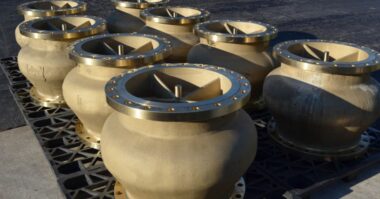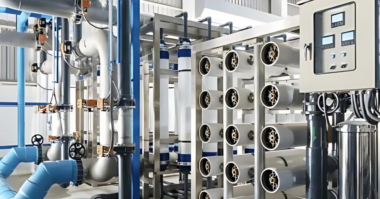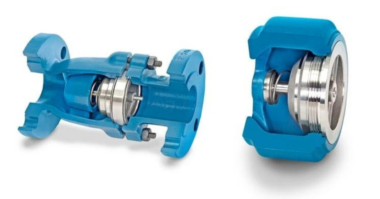Power generation is a time and resource-intensive process that depends on a series of interconnected systems to produce, store, and distribute power. To keep this network going, facilities rely on durable hardware that can handle regular fluctuations in demand without faltering. Reliable hardware comes from high-quality, responsive suppliers that understand the needs and challenges of power generation applications.
DFT® works every day to meet this need, providing high-performance valves and components that hold up to the repeated strains of the power generation industry. DFT has many varieties of check valves and control valves to help power generation customers make the best choice for their applications.
Industry Challenges
Power production and distribution is a complex industrial challenge, spanning global facilities while interfacing with disparate power grids. Any strain on power transmission systems is transmitted directly to customers, affecting the reliability.
This distribution challenge has been compounded by the introduction of thermal cycling—the process needed to produce energy on demand. While the service is growing in popularity for its efficiency, conventional plants were not designed for the rapid and repetitive start-stop cycles involved in on-demand energy production. The consequence is increased wear on components, including premature failure as well as problems with noise and vibration.
What’s more, power generation leaders are faced with a rapidly changing climate. Increased public attention on climate change has driven a push for renewable energy and efficient distribution, tasking companies to systematically improve the functionality of aging systems.
The net result of these challenges is a demand for more durable components designed specifically for the rigorous demands of the power industry. Valves experience a significant degree of stress in the power generation industry, which has driven the development of innovative designs that minimize maintenance and replacement.
Power Generation Applications and Industries
Modern power generation applications depend on various types of valve products. Common valve applications include discharging of boilers, pumps, and compressors. A check valve can prevent reverse flow in various systems while alleviating system surges. Other applications include steam and water lines, including boiler feeds that often see high pressures and temperatures. Silent check valves and severe service control valves regulate these system conditions with ease. Additional applications include those in cooling towers, evaporators, fly ash systems, and vacuum systems.
DFT®’s power generation valves are ideal for these routine operations, as well as emergency shut-off applications across facilities.
Industries
The larger umbrella of power generation encompasses many distinct sectors of the industry, each of which performs markedly different functions. As a result, the specific valves used in each arena may differ, so it’s important to work with an experienced supplier who can point you toward the most suitable products. DFT® carries a comprehensive line of valves customized for use in the following industries:
- Combined cycle. Combined cycle plants leverage both gas and steam turbines. These plants, while incredibly efficient, subject equipment to intense thermal and mechanical strain. DFT® power plant valves are designed specifically to meet the harsh operating challenges posed by power generation environments, meaning that they’ll last longer, perform better, and prolong the life of supporting components.
- Concentrated solar. Solar plants operate under extreme conditions with high temperatures. DFT® valves withstand the extreme heat of solar processing applications, including temperature fluctuations from steam, water, oil, or the ambient environment.
- Fossil fuel. These power stations rely on tight shut-off valves for incidents in high-temperature conditions. DFT® valves are engineered to withstand severe thermal events, assuring the plant can function as intended at all times.
- Geothermal. Geothermal control valves regulate the flow of brine and steam, so they must be corrosion-resistant and durable under high-temperature, high-moisture conditions. DFT® power generation valves provide reliable performance in notoriously tough working environments.
- Hydroelectric. Check valves and control valves play a crucial role in hydroelectric energy production. In addition to standard regulatory valves, which must consistently ensure that system flow remains within normal parameters, hydroelectric power plants require dependable shut-off valves for emergencies. DFT® power plant valves provide a rapid, tight seal for peace of mind in the event of pressure irregularities, making them the ideal choice for hydroelectric power facilities.
Whether your application falls into one of these categories or sits somewhere else in the power generation industry, DFT® offers state-of-the-art valve solutions sure to optimize your operations.
DFT® understand the importance of selecting the best valve, particularly when considering severe service applications, so DFT® has experienced representatives on hand to help you identify the most suitable products for your configuration.
Click here to read this success story about how DFT® Model WLC® SD Severe Service Check Valves were the solution for a Boiler feed pump discharge.
Choose DFT for Your Power Generation Valve Needs
DFT®’s power generation customers put their valves to the test, requiring consistent performance to protect employees and valuable equipment. Fortunately, DFT® has been in the business of manufacturing premium in-line check valves and severe service control valves for over 75 years, and their valves have earned their reputation for quality and durability.
DFT® develops valves with an eye toward the specific needs of their industry clients, including the many who come to them from geothermal, solar, and other power generation sectors. This mindset means their valves are specially tailored toward their operating environment, maximizing working life and protecting your investment in quality components. This approach allows them to solve common problems before they occur because they maintain lasting relationships with the companies using their products day-to-day. Through communicative partnerships, they identify and address industry-specific pain points and incorporate that information into each new iteration. The result is unmatched performance and reliability.
To see how our critical service valves can streamline your power generation operation, take a look at DFT®’s resource library.




Comments